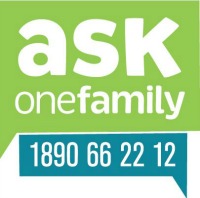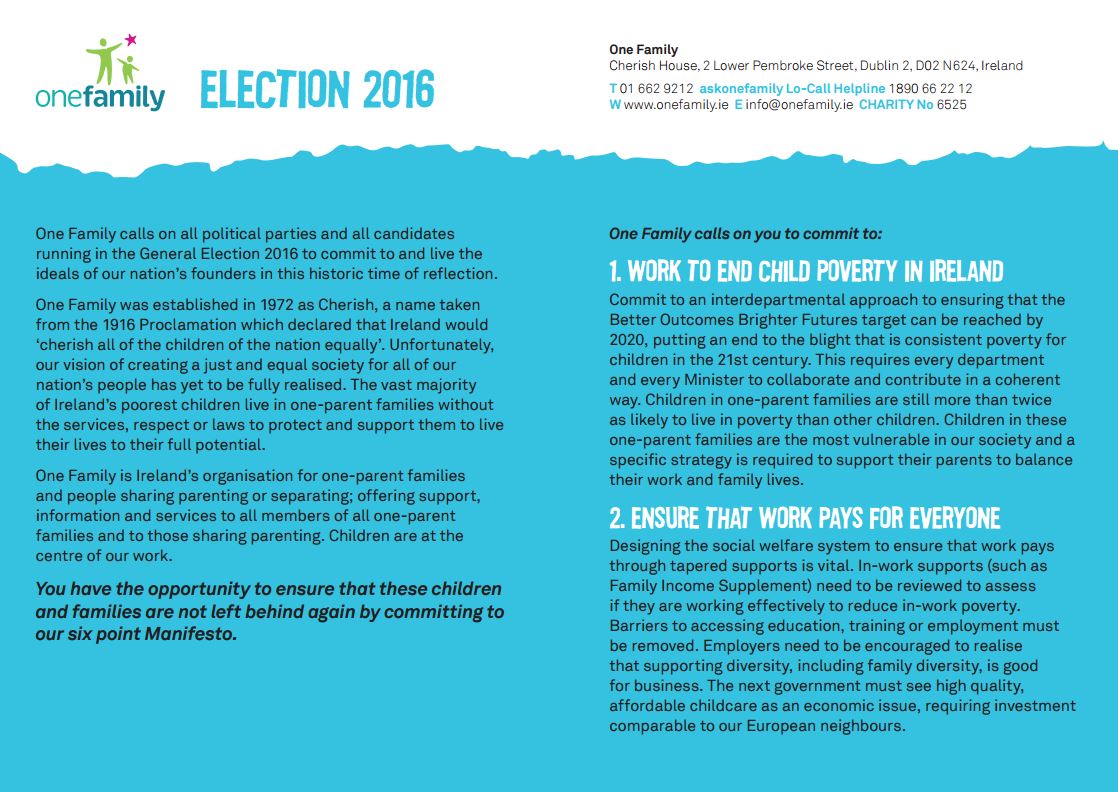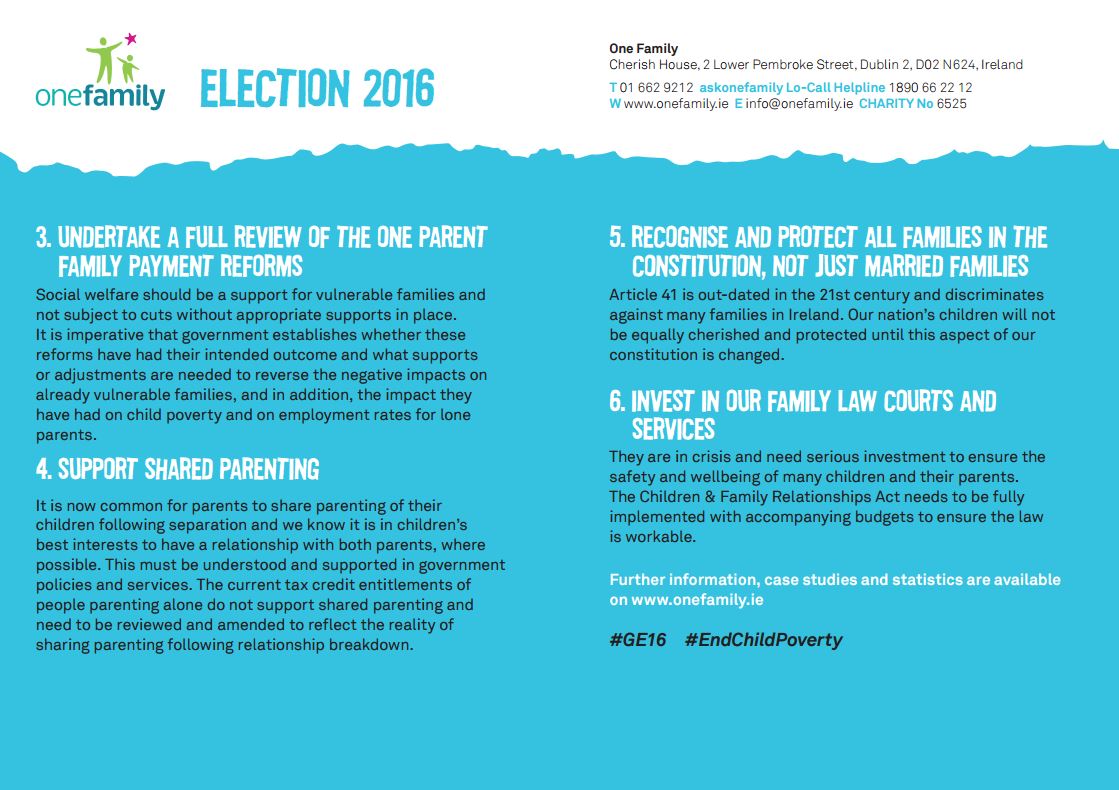 askonefamily is a helpline offering information and listening support for men and women who may be parenting alone, sharing parenting or separating. The helpline is also available to extended family, friends or professionals.
askonefamily is a helpline offering information and listening support for men and women who may be parenting alone, sharing parenting or separating. The helpline is also available to extended family, friends or professionals.
People call askonefamily for all kinds of reasons. They may have a question about their financial situation, maybe they are finding it difficult to communicate with their child’s other parent, or they may simply need a listening ear. Some other queries include:
- Parenting
- Family law issues
- Talking to your child about their family situation
- Social welfare benefits and entitlements
- Relationship breakdown
- Housing
- Childcare
- Return to education or employment
Call us on 1890 66 22 12 or 01 662 9212, from Monday to Friday between 10am-2pm. We also offer an email service for information.
The askonefamily helpline has been offered by One Family since 2004, supporting many thousands of parents by providing information, listening to their concerns, and letting them know about other available services both here in One Family and in their local community. When you call the helpline you will talk with one of the askonefamily team, either a staff member or a volunteer. This will be someone with training in non-directive listening and experience of parenting or working with families. We all need a listening ear at times or we might need information when we have a decision to make. When you call askonefamily you can expect to be listened to and given the right information that you need.
1890 66 22 12 is a lo-call number from land lines, but call rates to lo-call (1850/1890) numbers from mobile phones may vary. You should check specific details with your mobile service provider.
 One Family has been campaigning for equal rights for lone parents and those who are sharing parenting in the lead up to the election. The One Family election manifesto has six key points that need to be addressed by the next government to ensure these concerns are heard and dealt with.
One Family has been campaigning for equal rights for lone parents and those who are sharing parenting in the lead up to the election. The One Family election manifesto has six key points that need to be addressed by the next government to ensure these concerns are heard and dealt with.
- Work to end child poverty in Ireland.
- Ensure that work pays for everyone.
- Undertake a full review of the One Family Payment Reforms.
- Support shared parenting.
- Recognise and protect all families in the Constitution, not just married families.
- Invest in our family law courts and services.
We have analysed each party manifesto to identify their commitments to these six points in the document below.
Election Promises to One Family
With just one week to go until General Election 2016, we urge everyone to email their local candidates to ensure that one-parent families are on their agenda. We are calling for six key commitments which you can read about below.
It’s easy to email all of your local candidates in just one minute; click here. You can also download two handy documents with questions and take away messages for candidates who call to your door, to help ensure that they know that these issues matter for all families in Ireland.
#GE2016 #EndChildPovery #MyFamilyMatters
Use the social share buttons below to ask your friends and family to support our Election Manifesto for one-parent families.
On Monday the 18th January 2016, some parts of the Child and Family Relationships Act 2015 were commenced. These changes in legislation may have a direct impact on those parenting alone, sharing parenting and parenting after separation so the following information on Guardianship, Custody, Access and Maintenance may be relevant to you:
Guardianship
- For an unmarried father this means that he may automatically become a guardian of his child if he has lived with the mother on a continuous basis for 12 months and at least 3 of these months must be after the birth of the child.
This 12 month period only takes effect from the date this was enacted, so from the 18th January 2016 and is not retrospective.
- For other family members, such as grandparents, civil partners, step-parents and others who have acted in “loco parentis” (in the place of the parent) of a child they may apply to court for guardianship. The requirements for this is that a person is in a relationship, either in marriage or civil partnership, or has lived with the parent of a child for over 3 years and has shared the day to day care of the child for at least 2 years.
- If a person has cared for a child on a day to day to basis, continuously for 12 months and there is no parent or guardian able or willing to exercise the rights and responsibilities for the child then they may apply for guardianship, so for example this may be a grandparent caring for their grandchild or a foster parent caring for a child.
Access
- For grandparents the Act means that they can now apply directly to the District court for access with their grandchildren, if they do not already have access.
Custody
- A court may make an order for custody following an application by a person other than the mother or father. This may be a person who is a relative of the child; it may be a person with who the child has resided with, or if the person is married to, in a civil partnership with or who has cohabited with the parent of the child for at least 3 years and has been involved in the day to day care of the child for at least 2 years. A person may also seek custody where the child has resided with this person who has had day to day care of the child and who does not have a parent or guardian who is able or willing to take on the responsibilities of being the guardian.
Maintenance
- A maintenance order may be sought, requiring the cohabiting partner of a child’s parent to pay maintenance for the child, provided they are a guardian of the child.
Enforcement Orders
- These relate to access and custody whereby if a court order is made in respect of custody or access and this is unreasonably denied or not taken up then a parent or guardian may apply for an enforcement order. Such an order may require that:
A parent or guardian, or both attend counselling, mediation or a parenting programme
That additional access may be granted
That a parent or guardian be reimbursed for expenses as a result of the denial of access or the refusal to take up access.
Any decision made by the court will be made in the best interests of the child and the court will consider the views of the child where possible given his/her age and understanding.
